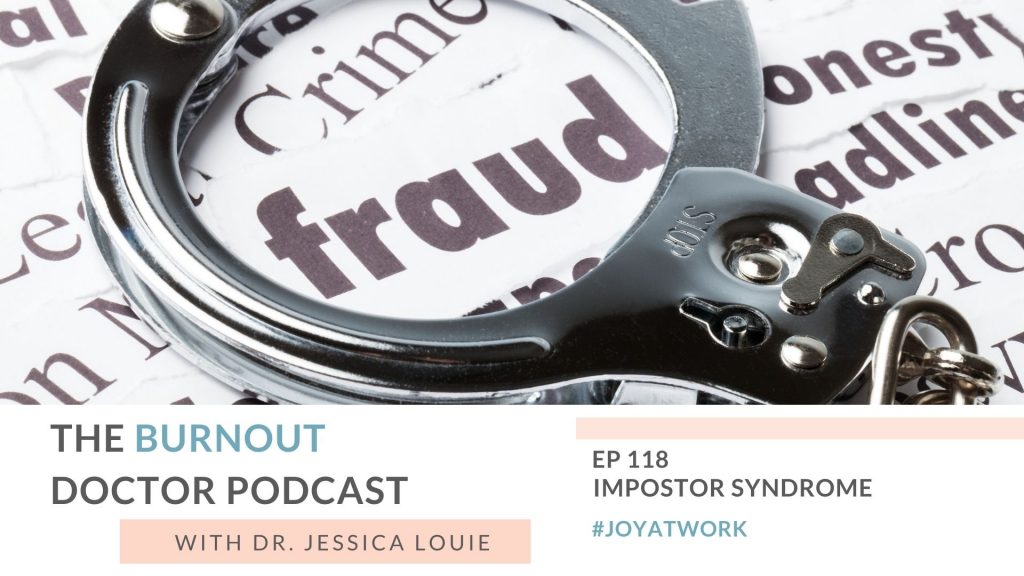
Is the biggest doubter of your success YOURSELF? Do you feel undeserving of your accomplishments? Do you feel overwhelmed by other people’s successes? Let’s talk about impostor syndrome today.
Listen to Podcast: iTunes | Spotify | Stitcher
Subscribe: Apple Podcasts | Android | Email | Google Podcasts
Download Podcast Workbook
Mentioned on Ep 118: Is the biggest doubter of your success YOURSELF? Do you feel undeserving of your accomplishments? Do you feel overwhelmed by other people’s successes? Let’s talk about impostor syndrome today.
Welcome back to The Burnout Doctor Podcast, I’m your host Dr. Jessica Louie. We are talking about what is impostor syndrome today and how to address it in your own life. Thank you for sharing your action steps from our last episode on how to give meaningful feedback in 3 simple steps. Many of you are taking action by using our complimentary Burnout Starter Kit – don’t forget to download yours today! We all write our own stories in our lives and homes. Let’s all bring joy into home and joy into work.
Impostor Syndrome
Is the biggest doubter of your success YOURSELF? Do you feel undeserving of your accomplishments? Do you feel overwhelmed by other people’s successes?
Yes, everyone has impostor syndrome in some way. You are NOT alone if you feel this way.
What is Impostor Syndrome?
Simply put: impostor syndrome causes us to worry that people will find out that we are a fraud…that we don’t really know what we are doing. Impostor syndrome involves constant feelings of self-doubt. These constant feelings of inadequacy and feeling that you are not worthy of your role, responsibilities or position. Impostor syndrome is a spectrum. Severe impostor syndrome can be paralyzing with fears or paranoia of being revealed or “outed” as a fraud.
“I have written 11 books but each time I think ‘Uh-oh, they’re going to find out now. I’ve run a game on everybody, and they’re going to find me out.” -Maya Angelou
What are signs that you may be suffering from Impostor Syndrome?
Often times, impostor syndrome arises when we are going through transitions in life. From student to resident or student to new professional. From one level in an organization to a higher level via promotion.
Signs or symptoms of impostor syndrome typically arise when we are in conversation with someone. Often times this means how positively or negatively someone talks about their life or feelings. For example, when someone is talking in a negative or cynical way it may be a sign of impostor syndrome.
For example, someone may be downplaying her or his accomplishments. Saying that everyone has this board certification or everyone matched for residency training. Saying that everyone has published an article or a book and therefore, their own accomplishment is meaningless
This is especially noticeable when you are talking about a recommending a person to a new position or training program and the person will not apply because she or he does not fit every single one of the requirements of the job description. Do you know someone like this?
Why you may be feeling Impostor Syndrome
Impostor syndrome may arise because of our environments and perspectives. For example, since the explosion of social media, have you felt you compare your accomplishments to others more often? You see a new post and wonder if you are good enough. Question you own success? Do. You feel left out, a step behind or unworthy?
For example, were you a top performing student or employee and then attend a college or switch to a new organization where it felt that everyone seemed smarter and more accomplished than you? I know I felt this way when I transitioned from high school, a top performer, and then attended USC where it was eye-opening the accomplishments, skillsets or world travelers that were now my classmates.
I personally have felt this more recently as I stepped out of the traditional role as a pharmacist and into this virtual world podcasting, writing, coaching and producing videos. Am I worthy of sharing my burnout stories? Am I worthy if my podcast has 50,000 listeners but my friend’s has 1 million? Do I need another certification before I start this new arm of my business?
No, I don’t. I know I have the skillset and am adding value to others.
First Steps to Address Impostor Syndrome
Acknowledge you may be misrepresenting yourself, your skillsets and your accomplishments. Journal out your feelings on this.
Pay attention to your Inner Mean Girl or Inner Mean Boy. This is a great time to go back to episode 9 of the podcast or your module on this in the Joy at Work course.
Talk about impostor syndrome with friends or colleagues to share your own stories and examples. This is an excellent way to cultivate the community around you that shares honestly, openly and transparently. We talked about this in our last podcast episode on how to approach community building.
Remind yourself that comparison syndrome does not serve you. Social media is a highlight reel and not representative of someone’s real whole life.
In my Joy at Work Course, you can get even more advice and action steps on how to address impostor syndrome and align work into your life.
Make sure you’re following along on our YouTube channel (youtube.com/drjessicalouie) as well with new videos going live every Saturday!
Until next time, spark joy my friends!
Tl;dr: What is impostor syndrome? How do I know if I have impostor syndrome. First steps to addressing impostor syndrome.
Note, my views are my own and are not associated or representative of my employer(s).
This podcast is for educational purposes only and not medical advice.
